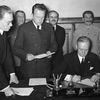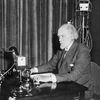27.12.2024 | 09:10
Íllu mß nafn gefa
Fyrsta stjˇrnin Ýslenska, sem gaf sjßlfri sÚr nafn, var „stjˇrn hinna vinnandi stÚtta“, sem myndu var 1934, en ■rßtt fyrir nafni hafi h˙n a baki sÚr minni hluta kjˇsenda, 43,6%. LÝklega hefi h˙n frekar ßtt a heita „stjˇrn hinna talandi stÚtta“. Ínnur stjˇrn, sem hlaut sÚrstakt nafn, var ■jˇstjˇrnin, sem myndu var 1939. H˙n var almennt talin ill nausyn, enda sagi ┴rni Pßlsson prˇfessor: „Ůa vilja allir hafa hana, en enginn kannast vi hana.“ Ůß var rßherrum fj÷lga ˙r ■remur Ý fimm, og Jˇn Helgason prˇfessor orti:
Eitt er ■ˇ nßlega ßlÝka veglegt hjß bßum,
■vÝ ÷rl÷gin veittu oss Ý smŠ vorri dřrmŠtan frama:
Rßherratalan ß ═slandi og Englandi er brßum
orin hin sama.
SˇsÝalistaflokkurinn var ■ˇ utan stjˇrnar, svo a h˙n var ekki raunveruleg ■jˇstjˇrn. En vegna nßinna tengsla SˇsÝalista vi KremlarbŠndur treystu arir ■eim ekki. Ůetta breyttist Ý strÝinu, ■egar R˙ssar b÷rust vi hli Breta og BandarÝkjamanna. ┴ri 1944 myndai Ëlafur Thors nřsk÷punarstjˇrnina me SˇsÝalistum. Ůegar bandarÝskur sendimaur spuri, hvers vegna hann hefi mynda stjˇrn me komm˙nistum, svarai hann: „Ůeir fengu svo gˇ memŠli, frß Roosevelt og Churchill.“ Ef ■eir gßtu starfa me StalÝn, ■ß gat hann ■a. Nřsk÷punarstjˇrnin eyddi ÷llum strÝsgrˇanum ß ■remur ßrum, stundum Ý ■÷rf verkefni. NŠsta stjˇrn, sem bar sÚrstakt nafn, var vireisnarstjˇrnin, sem sat frß 1959 til 1971, beitti sÚr fyrir afnßmi innflutningshaftanna og ■ˇtti farsŠl.
Jafnframt voru stjˇrnir, sem SjßlfstŠisflokkurinn ßtti ekki aild a, venjulega kallaar vinstri stjˇrnir: Hermann Jˇnasson myndai eina 1956, Ëlafur Jˇhannesson ara 1971 og ■ß ■riju 1978. SteingrÝmur Hermannsson myndai eina vinstri stjˇrn 1988 og Jˇhanna Sigurardˇttir ara 2009. ═ stjˇrn Jˇh÷nnu h÷fu allir arir rßherrar en h˙n sjßlf starfa um eitthvert skei Ý gamla Al■řubandalaginu, arftaka SˇsÝalistaflokksins. S˙ stjˇrn bei mesta kosningaˇsigur Ýslenskrar stjˇrnmßlas÷gu ßri 2013. En verur vŠntanleg stjˇrn ■eirra Kristr˙nar Frostadˇttur, Ůorgerar KatrÝnar Gunnarsdˇttur og Ingu SŠland vinstri stjˇrn? Og ■a Ý miri hŠgri bylgju hÚr og Ý heiminum ÷llum? Verur h˙n stjˇrn eyenda ea greienda?
(Frˇleiksmoli Ý Morgunblainu 21. desember 2024.)
Stjˇrnmßl og samfÚlag | Breytt s.d. kl. 09:17 | Slˇ | Facebook
27.12.2024 | 09:07
Stjˇrnarmyndun
N˙ vinna leitogar ■eirra ■riggja flokka, sem juku mest fylgi sitt Ý ■ingkosningunum 30. nˇvember 2024, a stjˇrnarmyndun, ■Šr Kristr˙n Frostadˇttir, Ůorgerur KatrÝn Gunnarsdˇttir og Inga SŠland. Samsteypustjˇrn Samfylkingar, Vireisnar og Flokks fˇlksins undir forsŠti Kristr˙nar er vissulega annar af tveimur r÷krÚttum m÷guleikum eftir kosningarnar. Hinn er samsteypustjˇrn SjßlfstŠisflokks, Vireisnar og Miflokks undir forsŠti Bjarna Benediktssonar. ═ rauninni rŠur Vireisn ■vÝ, hvor m÷guleikinn verur a veruleika, en h˙n virist afhuga samstarfi vi SjßlfstŠisflokk og Miflokk, ■ˇtt skammt sÚ milli flokkanna ■riggja Ý efnahagsmßlum.
┴ ═slandi hafa stjˇrnarmyndanir ■ˇ iulega veri eins og langdregin leikrit, sem stjˇrnmßlaflokkar setja ß svi til ■ess a ■urfa ekki a efna gßleysisleg lofor. Stundum hafa ■Šr teki ˇvŠnta stefnu, ■egar hefur komi a vali forsŠtisrßherra. Til dŠmis gßtu ■eir Hermann Jˇnasson, formaur Framsˇknarflokksins, og Ëlafur Thors, formaur SjßlfstŠisflokksins, hvorugur unnt hinum ■ess a skipa ÷ndvegi ßri 1947, og var ■vÝ leitogi minnsta flokksins, Al■řuflokksmaurinn Stefßn Jˇhann Stefßnsson, forsŠtisrßherra. Svipa gerist ßri 1978, ■egar sigurvegarar kosninganna ■a ßr, Al■řubandalag og Al■řuflokkur, gßtu hvorugur sŠtt sig vi stjˇrnarforystu hins, svo a Ëlafur Jˇhannesson, formaur Framsˇknarflokksins, myndai stjˇrn me ■eim, ■ˇtt flokkur hans hefi goldi afhro.
N˙ er hins vegar ljˇst, a vali er milli Kristr˙nar og Bjarna og langlÝklegast, a Kristr˙n myndi stjˇrn. En um hva?
(Frˇleiksmoli Ý Morgunblainu 14. desember 2024.)
Stjˇrnmßl og samfÚlag | Breytt s.d. kl. 09:16 | Slˇ | Facebook
27.12.2024 | 09:05
TÝmamˇt Ý stjˇrnmßlas÷gunni?
LÝfi er, eins og Milan Kundera sagi, ganga inn Ý ■oku, ■ar sem vi sjßum allt skřrt, ■egar vi horfum um ÷xl, en ˇgl÷ggt hitt, sem framundan er. En hugsanlega marka ■ingkosningarnar 30. nˇvember 2024 tÝmamˇt Ý stjˇrnmßlas÷gunni. N˙ er aeins einn yfirlřstur vinstri flokkur eftir ß ■ingi me 21 af hundrai atkvŠa, Samfylkingin, en undir nřrri forystu hefur hann hallast talsvert til hŠgri. Allt frß ■vÝ Ý ■ingkosningunum 1931 hafa fjˇrir flokkar keppt um atkvŠi kjˇsenda, SjßlfstŠisflokkur, Framsˇknarflokkur, Al■řuflokkur og Al■řubandalag (og forverar ■ess, komm˙nistaflokkurinn og SˇsÝalistaflokkurinn).
Ůa er ßlitamßl, hvort ■essum fjˇrum flokkum fŠkkai Ý ■rjß ßri 1999, ■egar Samfylkingin var stofnu me samruna Al■řuflokks, Al■řubandalags og tveggja smßflokka, ea hvort ■a gerist n˙na, ■egar Vinstri grŠnir duttu af ■ingi. Var hinn rÚtti arftaki Al■řubandalagsins Samfylkingin, ea var hann Vinstri grŠnir? ١tt Samfylkingin hefi erft digra sjˇi Al■řuflokks og Al■řubandalags, minntu Vinstri grŠnir ˇneitanlega meira ß hi gamla Al■řubandalag en Samfylkingin. AndspŠnis Samfylkingunni standa n˙ fimm flokkar, sem allir eru mi- ea mi-hŠgri flokkar.
Ůegar liti er til skamms tÝma, var rÝkisstjˇrninni 2021–2024 afdrßttarlaust hafna. Vinstri grŠnir hurfu nßnast, og Framsˇknarflokkurinn missti meira en helming sÝns fylgis. SjßlfstŠisflokkurinn tapai um fimmtungi sÝns fylgis, og fˇr ■ˇ betur en ß horfist. En furulegt var a heyra Ůorstein Pßlsson og fleiri spekinga halda ■vÝ fram Ý kosningasjˇnvarpi St÷var tv÷, a n˙ vŠri SjßlfstŠisflokkurinn Ý fyrsta sinn ekki stŠrsti flokkurinn. Ůeir muna ekki, a hi sama gerist Ý ■ingkosningunum 2009. Stjˇrnmßlasagan sřnir okkur sÝan, a flokkar, sem stofnair eru utan um menn frekar en mßlefni, endast illa, og gŠtu ■a ori ÷rl÷g Miflokksins og Flokks fˇlksins, eins og var um Samt÷k frjßlslyndra og vinstri manna, Bandalag jafnaarmanna, Borgaraflokkinn og Ůjˇvaka. Hver veit, hva břr Ý ■okunni?
(Frˇleiksmoli Ý Morgunblainu 7. desember 2024.) ááá
Stjˇrnmßl og samfÚlag | Breytt s.d. kl. 09:16 | Slˇ | Facebook
27.12.2024 | 09:02
Hugleiingar ß kj÷rdag
MÚr var Ý kosningabarßttunni hugsa til ora Sigurar Nordals Ý ═slenskri menningu ßri 1942. „Hßski sß, sem vofir yfir lřrŠi n˙tÝmans og hefur vÝa gert ■a svo valt, er framar ÷llu fˇlginn Ý flßttskapnum, ■egar almenningi er talin tr˙ um, a hann sÚ k˙gaur samkvŠmt umboi frß honum sjßlfum, ea hann er fyrst fÚflettur og sÝan lßtinn ■iggja sÝna eigin eign Ý m˙tur og nßargjafir,“ skrifai Sigurur. „Allmargt mß ganga ß trÚfˇtum um afkomu manna til ■ess a sß kostur sÚ betri a svipta ■ß dug og forsjß til frjßlsrar sjßlfbjargar og sambjargar.“
Ůa var ekki ˙t Ý blßinn, ■egar bandarÝski blaamaurinn H. L. Mencken kva kosningar vera uppbo ß fyrirframstolnum munum. FrŠgur var einn frambjˇandi Al■řuflokksins, ■egar hann var ß framboi Ý Dalasřslu ßri 1949. Fˇr hann ß milli bŠja me astoarmanni sÝnum og spuri bŠndur, hvort ■ß vanhagai ekki um eitthva. Einhver ■eirra drˇ seiminn og sagi, a flugv÷ll vantai a vÝsu Ý sřsluna. Frambjˇandinn sneri sÚr a astoarmanninum og sagi: „Skrifau flugv÷ll.“
Sigurur Nordal vÚk aftur a lřrŠinu Ý ˙tvarpserindi 1957. „Ef fˇlki er innrŠtt, a rÝki eigi a leysa og geti leyst ÷ll ■ess vandamßl, fer ■a a lokum a kenna rÝkinu um ÷ll sÝn mein. Hvort tveggja er vitanlega jafnfjarstŠtt. Ůa verur bŠi a grafa dřpra, skyggnast vÝar um og seilast hŠrra en rÝkisvaldi getur nokkurn tÝma nß til ■ess a finna brřnustu ■arfirnar, mestu vermŠtin, alls konar mannlegt b÷l og b÷lvabŠtur.“
═ kosningabarßttu vilja oft gleymast takmarkanir lřrŠisins. Ůa er ekki allra meina bˇt, heldur frisamleg afer til a skipta um valdhafa, sÚ ■ess talin ■÷rf. Hitt er anna mßl, a stundum verur Ý kosningum a velja skßrri kost af tveimur. „Haldi fyrir nefi og kjˇsi Kristilega lřrŠisflokkinn,“ sagi Ýtalski blaamaurinn Indro Montanelli ßri 1976, ■egar hŠtta var ß, a komm˙nistaflokkurinn kŠmist Ý stjˇrn.
(Frˇleiksmoli Ý Morgunblainu 30. nˇvember 2024.) áá
á
27.12.2024 | 08:59
Oslˇ, nˇvember 2024
Fimmtudagskv÷ldi 14. nˇvember 2024 var Úg staddur Ý Oslˇ og notai tŠkifŠri til a rabba vi nokkra Ýhaldsst˙denta um nř˙tkomna bˇk mÝna, Conservative Liberalism, North and South: Grundtvig, Einaudi and their Relevance Today. ╔g benti ß, a frjßlshyggja Štti sÚr dj˙par rŠtur Ý venjurÚtti og ■inghaldi norrŠnna ■jˇa, eins og Snorri Sturluson skrifai um Ý Heimskringlu, en lÝka Ý nßtt˙rurÚtti heilags Tˇmasar af AkvÝnas, en hann var sammßla Snorra um, a konungar vŠru bundnir af l÷gum og a afhrˇpa mŠtti ■ß, sem brytu ■au. Upp ˙r ■essum hugmyndum spryttu rÚttarrÝki, a l÷gin rÚu frekar en mennirnir, og lřrŠi, a almenningur gŠti skipt um valdhafa ß nokkurra ßra fresti, ef hann vildi.
═ rabbinu bar Úg saman ■jˇernis-frjßlshyggju danska skßldsins Grundtvigs og al■jˇa-frjßlshyggju Ýtalska hagfrŠingsins Einaudis. ╔g sagi frß ■vÝ, sem Úg kalla norrŠnu leiina Ý al■jˇamßlum: frisamlegur askilnaur ■jˇa, sjßlfstjˇrn ■jˇarbrota, landamŠrabreytingar samkvŠmt atkvŠagreislum, mßlskot til al■jˇadˇmstˇla um deilumßl rÝkja og sjßlfsprotti samstarf ■eirra me lßgmarksafsali fullveldis.
Enn fremur benti Úg ß m÷gulegar umbŠtur Ý Evrˇpusambandinu: a breyta framkvŠmdastjˇrninni Ý venjulega stjˇrnsřslustofnun og fŠra lagasetningarvald hennar til Evrˇpu■ingsins, a skipta Evrˇpu■inginu Ý efri deild rÝkja og neri deild kjˇsenda, a hŠtta a velja aeins inn mistřringarsinna Ý Evrˇpudˇmstˇlinn, a stofna sÚrstakan dˇmstˇl um nßlŠgarregluna (subsidiarity principle), sem ˙rskurai um valdm÷rk ■jˇrÝkja og Evrˇpusambandsins, og a hera reglur um evrˇpska selabankann.
(Frˇleiksmoli Ý Morgunblainu 23. nˇvember 2024.)
27.12.2024 | 08:58
Upphaf kvˇtakerfisins
Almenna bˇkafÚlagi gaf 7. nˇvember 2024 ˙t bˇkina Fish, Wealth, and Welfare: Selected Scientific Papers, Fiskur, fÚ og farsŠld: Valdar vÝsindaritgerir, eftir dr. Ragnar ┴rnason, prˇfessor emeritus Ý fiskihagfrŠi Ý Hßskˇla ═slands. Af ■vÝ tilefni var haldin al■jˇleg rßstefna Ý HßtÝarsal Hßskˇla ═slands me ■remur kunnum fiskihagfrŠingum frß ˙tl÷ndum 8. nˇvember. Var h˙n vel sˇtt og fyrirlestrarnir hinir frˇlegustu. Einn gestur var Ýslenskur a Štt, en hefur starfa Ý Noregi alla sÝna tÝ, R÷gnvaldur Hannesson.
FiskihagfrŠin kennir okkur, a fiskistofnar sÚu takm÷rku gŠi, sem takmarka veri aganginn a. Ragnar rifjai upp, a ß hßskˇlaßrunum vann hann ß Ůjˇhagsstofnun ß sumrin, ■ar sem honum var fali a kynna sÚr nřjustu rannsˇknir Ý fiskihagfrŠi, ■ar ß meal doktorsritger R÷gnvalds Hannessonar frß 1975, sem var brautryjendaverk. Ůetta sama ßr var settur leyfilegur hßmarksafli Ý sÝld, og fengu allir sÝldarbßtarnir s÷mu aflahlutdeild. Brßlega fˇru a heyrast raddir um, a hagkvŠmt gŠti veri a leyfa framsal aflaheimilda milli bßta. ┴ ■etta mßttu embŠttismenn ekki heyra minnst og vildu banna allt framsal.
Ragnar spuri hins vegar: Hvers vegna ekki a leyfa ■a? Hann fÚkk Jakob Jakobsson fiskifrŠing Ý li me sÚr, og framsali var leyft. Ůa olli hagrŠingu Ý greininni. Ůetta var vÝsir a ■vÝ kerfi framseljanlegra og varanlegra aflaheimilda, sem til var Ý sjßvar˙tvegi og hefur reynst Ý senn arbŠrt og sjßlfbŠrt. Framsali tryggir, a ■eir ˙tgerarmenn, sem reka bßta sÝna me mestum hagnai, halda ßfram veium, en hinir flytjast Ý ÷nnur st÷rf, sem henta ■eim betur.
(Frˇleiksmoli Ý Morgunblainu 16. nˇvember 2024.)
27.12.2024 | 08:56
Er Trump fasisti? Nei!
Ori „fasismi“ er n˙ lÝti anna en skammaryri. Ůa er ■ˇ ˇmaksins vert a leita s÷gulegrar merkingar ■ess. Fasismi einkennist a s÷gn bandarÝska sagnfrŠingsins Stanleys Paynes af ■rennu: andst÷u vi frjßlslyndisstefnu, Ýhaldsstefnu og komm˙nisma; tilraun til a taka stjˇrn ß ÷llum svium ■jˇlÝfsins og beina kr÷ftum a ßgengri utanrÝkisstefnu; rˇmantÝskri dřrkun ß ofbeldi, karlmennsku, Šskufj÷ri og umfram allt ÷flugum leitogum, sem virkja gŠtu fj÷ldann til samvirkrar framningar.
SamkvŠmt ■essu voru M˙ssˇlÝni og Hitler vitaskuld fasistar. En er Donald Trump ■a? ŮvÝ fer fjarri. Trump er a vÝsu andstŠingur komm˙nisma, en sŠkir margt Ý frjßlslyndisstefnu (lŠkkun skatta) og Ýhaldsstefnu (stuning vi fj÷lskylduna). Hann vill takmarka hlutverk rÝkisis og hafnar ßgengri utanrÝkisstefnu, en telur, a EvrˇpurÝkin eigi a kosta sjßlf varnir sÝnar, eins og elilegt er. Hann dregur a vÝsu upp ■ß mynd af sÚr, a hann sÚ ÷flugur leitogi, en hann vill einkum virkja einkaframtaki, ekki fj÷ldann.
Hva er Trump ■ß? Hann er pˇpulisti, fylgismaur lřstefnu, ■ˇtt spurningin sÚ, hvort hann meti meira lřhylli en lřskrum, a finna og framkvŠma vilja kjˇsenda frekar en egna ■ß upp og Šsa. Jafnframt jarar Trump vi a vera forrŠissinni, authoritarian. ═ bandarÝskum stjˇrnmßlum minnir hann einna helst ß Andrew Jackson, forseta BandarÝkjanna 1829–1837, og Huey Long, rÝkisstjˇra Ý Louisiana 1928–1932.
(Frˇleiksmoli Ý Morgunblainu 9. nˇvember 2024.)
27.12.2024 | 08:53
Fiskur, fÚ og farsŠld
═ dag, fimmtudaginn 7. nˇvember 2024, gefur Almenna bˇkafÚlagi ˙t bˇkina Fish, Wealth, and Welfare (Fiskur, fÚ og farsŠld) eftir Ragnar ┴rnason, prˇfessor emeritus Ý fiskihagfrŠi Ý Hßskˇla ═slands. Hefur h˙n a geyma tÝu merkustu ritgerir Ragnars ß ensku Ý fiskihagfrŠi, en eins og prˇfessor Gary Libecap sagi Ý vitali vi Morgunblai hausti 2023, er Ragnar einn virtasti fiskihagfrŠingur heims. Jafnframt starfi sÝnu Ý Hßskˇlanum hefur hann veri sÚrfrŠingur Al■jˇabankans Ý grein sinni og gefi ˙t um 200 frŠilegar ritgerir, skřrslur og bŠkur. Ritstjˇri hinnar nřju bˇkar er dr. Birgir ١r Runˇlfsson, forseti hagfrŠideildar Hßskˇla ═slands. ┴ morgun, f÷studaginn 8. nˇvember, halda hagfrŠideildin og RSE, Rannsˇknamist÷ Ý samfÚlags- og efnahagsmßlum, al■jˇlega rßstefnu af ■essu tilefni um fiskihagfrŠi Ý hßtÝarsal Hßskˇla ═slands klukkan 16 til 18, og vera bornar fram veitingar Ý anddyri a rßstefnu lokinni. Agangur er ˇkeypis og allir velkomnir. FrummŠlendur eru auk Ragnars prˇfessorarnir R÷gnvaldur Hannesson og Trond Bjorndal, en Ý pallbori vera prˇfessor Peder Andersen, Kaupmannahafnarhßskˇla, ┴rni M. Mathiesen, fyrrverandi astoarforstjˇri FAO, og Gumundur Kristjßnsson ˙tgerarmaur. Verur tŠkifŠri ß morgun nota til a afhenda bˇk Ragnars ßskrifendum.
Hver var ofveiivandinn?
Ekki ■arf a hafa m÷rg or um, hversu mikilvŠg hagkvŠm nřting fiskistofna er ß ═slandi, sem Ketill flatnefur kallai ■egar ß nÝundu ÷ld veiist÷. Sjßlfur fˇr Úg ekki a hugsa um ■etta mßl af neinni alv÷ru fyrr en ß rßstefnu StjˇrnunarfÚlagsins um „═sland ßri 2000“, sem haldin var ß Ůingv÷llum hausti 1980. Ůß sagi Haraldur Ëlafsson mannfrŠingur ■ann vanda ˇleystan, hvernig koma Štti Ý veg fyrir ofveii ß ═slandsmium. Hefu ═slendingar ef til vill ■urrausi fiskistofnana, ■egar komi vŠri fram ß ßri 2000? Yri rÝki ekki a taka n˙ ■egar Ý taumana? ╔g varpai ■vÝ fram, hvort ekki mŠtti leysa ofveiivandann ß sama hßtt og annan ofnřtingarvanda aulinda, me ■vÝ a skilgreina einkanřtingarrÚtt einstaklinga og ■ß vŠntanlega ˙tgerarmanna sjßlfra ß hinum ofnřttu gŠum, fiskimium ea fiskistofnum. Sˇtti Úg ■etta rß Ý smiju austurrÝsku hagfrŠinganna Ludwigs von Mises og Friedrichs A. Hayeks, en Úg hafi s÷kkt mÚr niur Ý rit ■eirra.
Ëspart var gert gys a ■essu ß rßstefnunni og sÝan Ý Ůjˇviljanum, mßlgagni sˇsÝalista, en ritstjˇri ■ess, ┴rni Bergmann, var einn rßstefnugesta. Ůa er hins vegar frˇlegt, a ß sama tÝma fˇr Ragnar ┴rnason ara lei, en a sama marki, me strangvÝsindalegum rannsˇknum Ý fiskihagfrŠi, studdum stŠrfrŠi. Hann lauk doktorsprˇfi Ý aulindahagfrŠi frß Hßskˇlanum Ý Bresku KˇlumbÝu ßri 1984, og ■egar sÚrstakt prˇfessorsembŠtti var stofna Ý fiskihagfrŠi vi Hßskˇla ═slands, var Ragnar skipaur Ý ■a, gegndi ■vÝ til sj÷tugs og er enn a, sj÷tÝu og fimm ßra.
Breski hagfrŠingurinn Arthur C. Pigou lřsti hinum almenna ofnřtingarvanda me frŠgu dŠmi Ý bˇk sinni FarsŠldarfrŠi (The Economics of Welfare) ßri 1920. Tveir misgˇir vegir liggja milli tveggja staa. Betri vegurinn er ■r÷ngur, verri vegurinn vÝur. Pigou benti ß, a umferin myndi ekki skiptast ß hagkvŠman hßtt milli veganna tveggja. Ůr÷ngi vegurinn yri ofnřttur, vÝi vegurinn vannřttur. ┴stŠan var, a hver og einn ÷kumaur tˇk ekki me Ý reikninginn kostnainn af ÷rum ÷kum÷nnum. Ůeir ■yrptust ■vÝ allir ß betri veginn og eyddi ßbatanum af honum. Ůa geru ■eir me umferart÷fum og ÷rum kostnai af ofnřtingu. Lausn Pigous var, a rÝki innheimti vegartoll af betri veginum, sem endurspeglai umframkosti hans.
Yfirsjˇn um aulindaskatt
Ůeir Ýslensku hagfrŠingar, sem fyrstir skrifuu um ofveiivandann, ■eir Bjarni Bragi Jˇnsson og Gylfi Ů. GÝslason, fŠru greiningu Pigous ˇbreytta yfir ß fiskveiar. Ef ˙tgerarmenn sŠktu tv÷ misgˇ fiskimi, ■ß myndu ■eir ofnřta betri miin og vannřta hin verri. Ůeir tŠkju ekki me Ý reikninginn kostnainn af sˇkn annarra. Lausn ■eirra Bjarna Braga og Gylfa var aulindaskattur, sem rÝki myndi innheimta af ˙tgerarm÷nnum og Štti a endurspegla misjafna kostiáˇlÝkra fiskimia Ý samanburi vi ÷nnur kn÷pp gŠi, sem menn nřttu sÚr til ßvinnings. Aulindaskatturinn var ■annig sama elis og vegartollur Pigous.
BandarÝski hagfrŠingurinn Frank H. Knight benti hins vegar ■egar ßri 1924 ß yfirsjˇn Ý greiningu Pigous. Honum hafi sÚst yfir ■ann m÷guleika, a vegirnir misgˇu vŠru Ý einkaeigu. Ůß myndi eigandi betri vegarins innheimta hŠrri vegartoll af honum en eigandi verri vegarins og umferin skiptast sjßlfkrafa ß hagkvŠman hßtt milli veganna tveggja. (Pigou fjarlŠgi ■egjandi og hljˇalaust vegardŠmi ˙r nŠstu ˙tgßfu bˇkar sinnar.) ┴ri 1990 birti Ragnar ┴rnason tÝmamˇtaritger Ý Canadian Journal of Economics, sem er fyrsta greinin Ý hinni nřju bˇk hans, og ■ar tekur hann upp ■rßinn frß Knight. Hann bendir ß, a aulindaskattur Ý anda Pigous krefjist miklu meiri upplřsinga en embŠttismenn Ý opinberri fiskistofu rßi yfir. Hins vegar sÚ til einf÷ld afer til a takmarka agang a fiskimium, svo a nřting ■eirra veri hagkvŠm. H˙n sÚ a ˙thluta framseljanlegum og ˇtÝmabundnum nřtingarrÚttindum ß fiskistofni til ˙tgerarmanna og setja leyfilegan hßmarksafla ˙r stofninum ß hverri vertÝ ß ■ann hßtt, a ■essi rÚttindi veri Ý heild sem vermŠtust. Ůannig spari fiskistofumenn sÚr a afla margvÝslegra upplřsinga, sem sÚ hvort sem er erfitt ea ˇkleift a tÝna saman. ═ sta ■ess a rÝki stjˇrni veiunum geti ■a lßti sÚr nŠgja a setja um ■Šr almennar reglur.
┴ ═slandi h÷fu ˙tgerarmenn og embŠttismenn raunar smßm saman veri a ■reifa sig ßfram Ý ßtt a svipari lausn ßrin ß undan, og h˙n var l÷gfest me heildarl÷gum um fiskveiar vori 1990. Ůetta var ekkert anna en hi margrŠdda og umdeilda kvˇtakerfi Ý sjßvar˙tvegi, sem sÝan hefur skila stˇrkostlegum ßrangri. ١tt ■etta kerfi hafi ■vÝ frekar veri niurstaa aferar happa og glappa en alsk÷pu gyja, sem sprotti hafi ˙r h÷fi vitringa eins og A■ena ˙r h÷fi Seifs forum, munai mj÷g um, a ■eir Ragnar ┴rnason og R÷gnvaldur Hannesson l÷gu sitt lˇ ß vogarskßlina, veittu gˇ rß, ˙tskřru kerfi.
EinkaeignarrÚttur ß aulindum
Ůegar liti er yfir greinarnar Ý hinni nřju bˇk Ragnars ┴rnasonar, sÚst, a hann hefur me ßrunum lagt sÝfellt meiri ßherslu ß einkaeignarrÚtt ß aulindum til tryggingar hagkvŠmri nřtingu ■eirra. Hann bendir ß, a slÝkur rÚttur sÚ forsenda frjßlsra viskipta og ■vÝ upphaflegri en ■au. Menn fŠru sig af hiringjastiginu, ■egar eignarrÚttur myndaist ß landi og kvikfÚnai me giringum og merkingum (fencing and branding), en eftir ■a gßtu ■eir skipst ß frjßlsum markai ß ■eim varningi, sem ■essi gŠi gßfu af sÚr. ŮvÝ traustari og betur varinn sem einkaeignarrÚttur ß aulindum sÚ, ■vÝ hagkvŠmari veri nřting ■eirra til langs tÝma liti. Ůa, sem stundum sÚ kalla „markasbrestur“ (market failure), ■egar erfitt virist ea ˇkleift a stunda frjßls viskipti me gŠi, stafi iulega af ■vÝ, a ekki hafi myndast einkaeignarrÚttur ß slÝkum gŠum. DŠmi Pigous um vegina tvo var eins og Knight benti ß um, a vegirnir voru ekki Ý einkaeigu, svo a agangur a ■eim var ekki verlagur Ý samrŠmi vi misjafna kosti ■eirra. Anna dŠmi er mengun Ý ßm ea v÷tnum. ┴stŠan er s˙, a enginn ß og gŠtir ■essara gŠa. Ůrija dŠmi eru dřr Ý ˙trřmingarhŠttu, svo sem fÝlar og nashyrningar Ý AfrÝku. Enn er ßstŠan, a enginn ß ■essa stofna og gŠtir ■eirra. Umhverfisvernd krefst umhverfisverndara.
MikilvŠgt er einnig a horfa ekki aeins ß gŠin af sjˇnarhˇli samtÝmans, mia vi n˙verandi nřtingarkosti og tiltŠka tŠkni. Ůegar einkaeignarrÚttur er ß slÝkum gŠum, geta eigendurnir lßti reyna ß nřja nřtingarm÷guleika, ■rˇa nřja tŠkni. Sk÷punarmßttur hins frjßlsa markaar er aallega vegna ■ess, a hann er eins og risastˇr tilraunastofa, ■ar sem menn prˇfa sig ßfram, bera sig saman vi ara, keppa vi ara me ■vÝ a keppast vi sjßlfir, ÷last nřja ■ekkingu og taka Ý notkun nřja tŠkni. Til ■ess ■arf einkaeignarrÚtt, fjßrfesta, frumkv÷la.
Uppbosleiin ˇraunhŠf
Ůetta skiptir allt mßli, ■egar skoaar eru nřrri till÷gur um ara tilh÷gun veia ß ═slandsmium en ■ß, sem var fyrir valinu. Sumir viurkenna, a kvˇtakerfi sÚ a vÝsu hagkvŠmt, en hin upphaflega ˙thlutun hafi veri ranglßt. Elilegast hefi veri, segja ■eir, a rÝki hefi boi upp nřtingarrÚttindin, veiileyfin, aflakvˇtana. En uppbossinnum yfirsÚst ˙rlausnarefni. Ůa var, hvernig Štti a takmarka agang a takm÷rkuum gŠum, sem h÷fu lengi veri nřtt og voru n˙ greinilega ofnřtt. Tali var, ■egar kvˇtakerfi var sett ß Ý ßf÷ngum ßrin 1975–1990, a fiskiskipaflotinn vŠri nŠr tv÷falt stŠrri en hann ■yrfti a vera. Breyta ■urfti ■ˇ fyrirkomulagi fiskveia ß ■ann hßtt, a sem minnst r÷skun yri ß h÷gum ■eirra, sem nřttu h÷fu fiskimiin. Hefi miunum skyndilega veri loka, eftir a ■au h÷fu ÷ldum saman veri opin, en agangur sÝan veri boinn upp og ver haft nˇgu hßtt til ■ess, a helmingur fiskiskiptaflotans hefi strax ori a hŠtta veium (eins og lagt var til), ■ß hefi helmingur ˙tgerarfyrirtŠkjanna ■urft a horfa upp ß, a fjßrfestingar ■eirra Ý skipum, veiarfŠrum og mannaui hefu skyndilega ori verlausar. Ůa gefur augalei, a ekkert samkomulag hefi ori um slÝka breytingu.
Elilegasta ˙thlutunaraferin var auvita svok÷llu afaregla (grandfathering), sem var ˙thlutun eftir aflareynslu. Ůeir, sem veitt h÷fu til dŠmis fimm af hundrai heildarafla Ý fiskistofni sÝustu ßrin, ßur en fiskimium var loka, fengu heimild til a veia fimm af hundrai leyfilegs hßmarksafla ß vertÝinni. ËlÝkt uppbosleiinni var afareglan Pareto-hagkvŠm, en me ■vÝ er ßtt vi, a vi breytinguna, hagrŠinguna, var hagur einskis manns skertur, en hagur a minnsta kosti sumra mj÷g bŠttur, eins og kom ß daginn ß ═slandi.
Hlunnindi Ý almenningi
N˙ segja sumir a vÝsu, a hagur ■jˇarinnar hafi veri skertur me kvˇtakerfinu, ■vÝ a fßmennum hˇpi ˙tgerarmanna hafi veri afhent ÷ll nřtingarrÚttindi ß ═slandsmium, sem sÚu l÷gum samkvŠmt Ý ■jˇareign. En ■ß er ■ess a gŠta, a Ý raun og veru var enginn rÚttur tekinn af ÷rum, ■egar fiskimiunum var loka, ■vÝ a eini rÚtturinn, sem hvarf ˙r s÷gu, var rÚtturinn til a gera ˙t ß n˙lli, eins og fiskihagfrŠingar h÷fu sřnt fram ß: Vi ˇtakmarkaan agang a fiskimium jˇkst sˇknin upp a ■vÝ marki, a allur ßbati af veiunum hvarf Ý ˇ■÷rfum kostnai. Ůa var vitanlega enginn bŠttari vi ■a, a ■essi rÚttur til a gera ˙t ß n˙lli hyrfi. Spurningin er sÝan, hva ori „■jˇareign“ merki og til hvers ■a vÝsi. Hugmyndin um ■jˇareign aulinda Štti a minnsta kosti ekki a merkja, a rÝki eigi aulindirnar og nřti. BolsÚvÝkar komu me fßdŠma h÷rku ß samyrkju Ý R˙sslandi og ┌kraÝnu, og ■a kostai hungursneyir ß vÝßttumikilli slÚttu, sem var eins og sk÷pu til akuryrkju. OlÝulindir eru Ý eigu rÝkisins Ý MexÝkˇ, en einstaklinga Ý Texas, og ■ˇ flykkist fˇlk ekki frß Texas til MexÝkˇ, heldur ÷fugt.
Elilegast er a leggja ara merkingu Ý ßkvŠi um ■jˇareign aulinda: Fara skuli svo me aulindir, a ■Šr skili hßmarksari til langs tÝma Ý ■jˇarb˙i. Ůa ß svo sannarlega vi um kvˇtakerfi Ýslenska Ý sjßvar˙tvegi. Ůa eru hvorki fiskimiin nÚ fiskistofnarnir, sem eru undirorpnir eignarrÚtti einstaklinga, heldur nřtingarrÚttindin, sem lÝta mß ß sem hlunnindi Ý almenningi, sem ekki veri tekin bˇtalaust af handh÷fum ■eirra, enda hafi ■au myndast Ý langri ■rˇun og hloti s÷gulega helgun, eins og l÷gfrŠingar (■ar ß meal prˇfessor Sigurur LÝndal) myndu segja. Ragnar ┴rnason hefur sÝan spurt, vi hvaa skipulag ■jˇin grŠi mest ß fiskveium, og svara henni svo, a ■a sÚ vi sem traustust og f÷stust nřtingarrÚttindi Ý h÷ndum einkafyrirtŠkja. Fiskveiiarurinn rennur ekki til ■jˇarinnar, ef rÝki reynir a gera hann upptŠkan, heldur gerist ■ß hvort tveggja, a hann minnkar og verur enn einn tekjustofn atvinnustjˇrnmßlamanna Ý samkeppni ■eirra um atkvŠi. Ůa er ekki tilviljun, a ß ═slandi skilar sjßvar˙tvegur beint og ˇbeint feikilegu fÚ Ý ■jˇarb˙i, en Ý flestum ÷rum l÷ndum er hann rekinn me tapi og er ■ess vegna ■ung byri ß skattgreiendum. Ragnar hefur lÝka bent ß, a sjßvar˙tvegur er ß ═slandi ˙tflutningsatvinnuvegur Ý harri samkeppni vi s÷mu grein Ý ÷rum l÷ndum, og ■ess vegna ■urfi a fara varlega Ý a skattleggja hann umfram ara atvinnuvegi.
Salka Valka sagi sem frŠgt var: „Ůegar ÷llu er ß botninn hvolft, ■ß er lÝfi ■ˇ umfram allt saltfiskur, en ekki draumaringl.“ ═ bˇk sinni um fisk, fÚ og farsŠld fer Ragnar ┴rnason ekki me neitt draumaringl, heldur r÷kstyur, hvernig hagkvŠmast sÚ a nřta aulindir og ■ß sÚrstaklega ■Šr, sem ═slendingar eiga. Ůar heldur hann sÚr fast vi hina frŠilegu hli mßlsins. ١tt hann noti iulega stŠrfrŠi til a skřra og skerpa boskap sinn, endursegir hann um lei ß auskiljanlegan hßtt r÷ksemdir sÝnar. Ůa auveldar lesturinn, a Birgir ١r Runˇlfsson skrifar frˇlegan inngang. Og ■ˇtt lÝfi sÚ auvita ekki aeins saltfiskur, skipta gˇ almenn lÝfskj÷r miklu mßli. Saltfiskurinn er til a selja og fÚ fyrir hann til a velja. Salka Valka sagi lÝka, a ■a vŠru „■unnar trakteringar a lßta menn ■rŠla nˇtt og dag alla sÝna Švi, hafa hvorki Ý sig nÚ ß“. Ůetta var ■ˇ Ý ■˙sund ßr hlutskipti fßmennrar ■jˇar Ý harbřlu landi, ßur en sjßvar˙tvegur var h÷fuatvinnuvegur ═slendinga. Ůa er engin tilviljun, a n˙ eru ═slendingar me einhverjar hŠstu mealtekjur Ý heimi, auk ■ess sem fßtŠkt er hverfandi og tekjudreifing tilt÷lulega j÷fn.
Vegurinn til fjßr og farsŠldar
Fiskur var ekki aeins tßkn ═slands ÷ldum saman Ý skjaldarmerki Danakonungs, heldur vegur til fjßr og farsŠldar, eins og ■eir Thor Jensen Ý Kveld˙lfi, Jˇn Ëlafsson Ý Alliance, Ingvar Vilhjßlmsson, Tryggvi Ëfeigsson og fj÷lmargir arir dugmiklir athafnamenn sřndu ß ÷ndverri tuttugustu ÷ld, ■egar ■jˇin skeiai ß sj÷mÝlnaskˇm ˙r fßtŠkt til bjargßlna. Og n˙ hafa ■au Kristjßn Loftsson Ý Hval, Gumundur Kristjßnsson Ý Brimi, Gubj÷rg MatthÝasdˇttir Ý ═sfÚlaginu, Sigurgeir Brynjar Kristjßnsson Ý Vinnslust÷inni, Gur˙n Lßrusdˇttir Ý Stßlskipum, Ůorsteinn Mßr Baldvinsson Ý Samherja, ١rˇlfur GÝslason Ý KaupfÚlagi Skagfiringa og margir arir framkvŠmdasamir og forsjßlir athafnamenn lyft upp ■eirra merki, landi og ■jˇ til heilla.
(Grein Ý Morgunblainu 7. nˇvember 2024.)
27.12.2024 | 08:51
450 ßra saga merkilegs lřveldis
ŮegaráVilhjßlmur kardÝnßli af SabÝna kom til Noregi ßri 1247 Ý ■vÝ skyni a krřna Hßkon gamla, sagi hann ■ß „ˇsannlegt“ um ═sland, a ■a ■jˇnai ekki undir konungi eins og ÷ll ÷nnur l÷nd. ═slenskir sagnfrŠingar hafa ekki bent ß, hversu frßleit ■essi fullyring var mia vi astŠur sjßlfs kardÝnßlans. Hann var frß ═talÝu, ■ar sem nokkur borgrÝki ■jˇnuu ekki undir neinn konung, og hann hafi ßri 1222 veri Ý LÝflandi (Eistlandi og Lettlandi n˙tÝmans) a mila mßlum milli riddarareglu, sem rÚ landinu, og nßgrannarÝkjanna. En mÚr duttu ■essi or Ý hug, ■egar Úg var ß d÷gunum staddur Ý krˇatÝsku borginni Dubrovnik vi AdrÝahaf. ┴ri 1247 var borgin enn ß valdi Feneyinga (og ekki neins konungs), en ßri 1358 tˇkst Ýb˙unum a stofna sjßlfstŠtt lřveldi, sem stˇ allt til 1808, ■egar Napˇleon beitti valdi til a leggja ■a niur.
Lřveldi Dubrovnik (sem ■ß var nefnt Ýtalska nafninu Ragusa) var a sÝnu leyti jafnmerkilegt og Ýslenska ■jˇveldi. ŮvÝ stjˇrnuu (eins og Ýslenska ■jˇveldinu) nokkrar Šttir, um fimmtÝu (en ß ═slandi voru 39 goar). Menn ˙r ■essum Šttum settust allir Ý stˇrrß borgarinnar, ■egar ■eir nßu 18áßra aldri. Stˇrrßi kaus sj÷ manna framkvŠmdarß, 45 manna ÷ldungadeild og h÷fusmann (rektor), sem kom fram fyrir h÷nd lřveldisins ˙t ß vi og fˇr me framkvŠmdavald Ý samstarfi vi framkvŠmdarßi og ÷ldungadeildina. Reynt var a koma Ý veg fyrir frŠndhygli og ara spillingu me ■vÝ, a hver h÷fusmaur sat aeins Ý einn mßnu, og ekki mßtti endurkjˇsa hann fyrr en eftir tv÷ ßr. Ef til vill mŠtti lÝkja honum vi Ýslenska l÷gs÷gumanninn, ■ˇtt sß vŠri kj÷rinn til ■riggja ßra, en hann var Ý rauninni eini embŠttismaur Ůjˇveldisins.
Stjˇrnarfar var frjßlslegt Ý Dubrovnik, ■ˇtt aalsŠttirnar fimmtÝu fŠri einar me rÝkisvaldi. Borgin dafnai vel og var mist÷ verslunar milli Tyrkjaveldis soldßnsins og EvrˇpurÝkja. Uru margir Ýb˙ar auugir. L÷ggj÷f var sniin a ■÷rfum verslunar og atvinnulÝfs, en ß fßna lřveldisins var letra ori „Libertas“, frelsi.
(Frˇleiksmoli Ý Morgunblainu 2. nˇvember 2024.)
27.12.2024 | 08:50
Dubrovnik, oktˇber 2024
Dubrovnik Ý KrˇatÝu er ein fallegasta borg, sem Úg hef komi til. Ůar talai Úg ß rßstefnu evrˇpskra Ýhalds- og umbˇtaflokka um fj÷lskylduna, aldurs■rˇun og frjˇsemi 18. oktˇber 2024. ╔g rifjai upp, a Aristˇteles geri Ý MŠlskulistinni greinarmun ß vihorfum Šskumanna, sem lÚtu stjˇrnast af vonum, og ÷ldunga, sem yljuu sÚr vi minningar. Rosknu fˇlki hefi fj÷lga hlutfallslega me hŠkkandi mealaldri, og ■a kysi frekar Ý kosningum en ungt fˇlk, svo a ■a hefi sÝaukin stjˇrnmßlaßhrif. En ellin ■yrfti sÝur en svo a vera byri ß Šskunni. H˙n gŠti lagt sitt af m÷rkum til aukinnar framleislu og neyslu. KŠnir stjˇrnmßlamenn Šttu a h÷fa jafnt til vona Šskunnar, fj÷lga tŠkifŠrum, og ˇtta ellinnar, verjast ˇ■jˇalř.á
╔g sagi hagfrŠinga hafa bent ß, a fj÷lskyldan hefi l÷ngum veri eins konar gagnkvŠmt tryggingarfÚlag og vettvangur sjßlfvalinnar verkaskiptingar kynjanna, jafnframt ■vÝ sem h˙n vŠri miklu hagkvŠmari neyslueining en einstaklingurinn. Fj÷lskyldan milai lÝka nausynlegri ■ekkingu Ý bßar ßttir. Gˇir foreldrar Šlu b÷rn sÝn upp vi ■Šr reglur og dygir, sem best hefu reynst, svo sem stundvÝsi, vinnusemi, orheldni og hreinlŠti. Ůannig miluu ■eir til ■eirra reynsluviti fyrri kynslˇa, fortÝinni. Fj÷lskyldan bŠtti sÝan framtÝinni vi Ý ˙treikninga og ßkvaranir einstaklinga, ■vÝ a ■eir vildu sem foreldrar skilja eitthva eftir fyrir b÷rn sÝn, b˙a Ý haginn fyrir ■au. Erfaskattur vŠri ranglßtur, ■vÝ a me honum vŠri umbuna fyrir eyslu og refsa fyrir sparna, samtÝin tekin fram yfir framtÝina.
╔g bŠtti ■vÝ vi, a fj÷lskyldan gŠddi lÝf einstaklinganna tilgangi og merkingu. H˙n vÝkkai ˙t sjßlfi. Menn lifu ekki aeins fyrir sjßlfa sig, heldur lÝka fyrir maka og b÷rn.
(Frˇleiksmoli Ý Morgunblainu 26. oktˇber 2024.)









